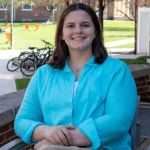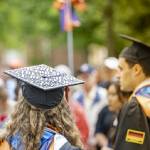
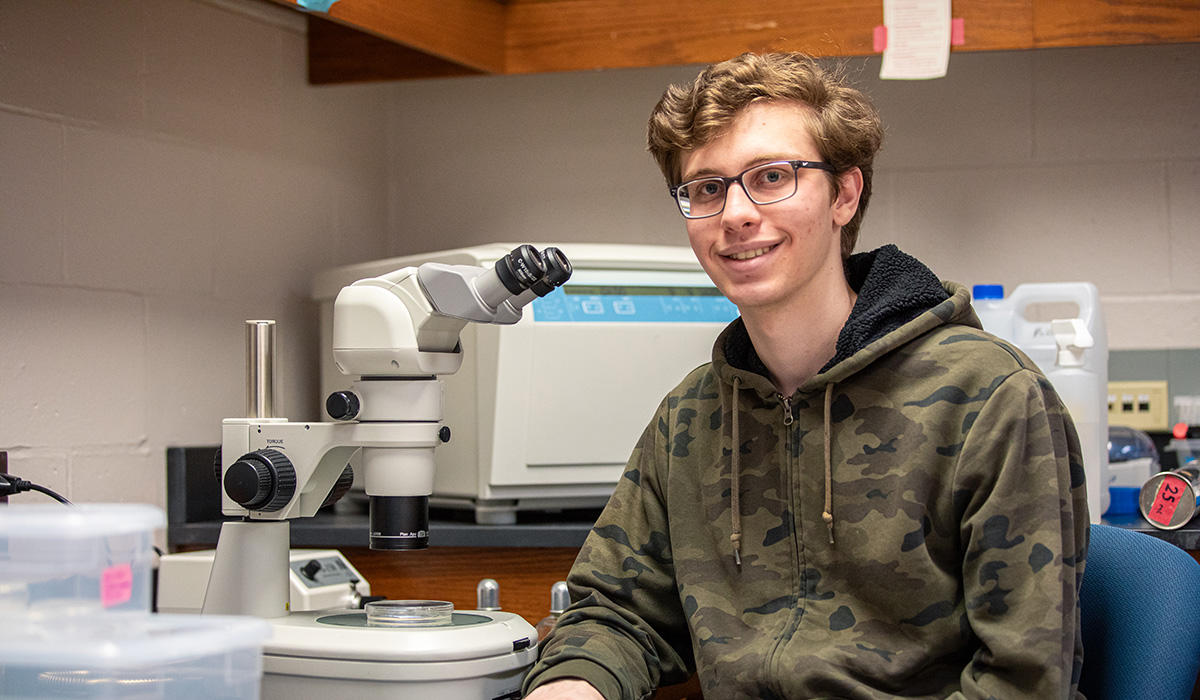
In his three years thus far as a Gettysburg College student, Dylan Kemmerer ’25 of Holmdel, New Jersey, has experienced the transformational nature of Gettysburg’s liberal arts and sciences education, one that’s allowed him to challenge himself in his academics and co-curricular activities. Through the Gettysburg Approach, Kemmerer has found opportunities to build his breadth and depth of knowledge and develop enduring skills to serve him at Gettysburg and further into his future, as he sets his sights on Ph.D. studies and scholarly research.
Earlier this year, Kemmerer’s hard work was recognized with a prestigious Barry Goldwater Scholarship for the 2024-2025 academic year. The Goldwater Scholarship is the highest award given to undergraduate STEM students in the country.
“[Receiving a Goldwater Scholarship is] reflective of the culmination of everything that I’ve done here so far at Gettysburg,” he said. “I’ve had all these great research opportunities. I’ve had all these great interactions with faculty and other opportunities presented to me here. It makes me even more excited for the future, knowing that there’s so much more to take advantage of beyond Gettysburg.”
Learning and teaching through mathematics
Kemmerer, a double major in biochemistry-molecular biology (BMB) and mathematics, said his love of learning began at a young age.
“I was 3 years old, and I would make these dioramas with animals and put them in my local library. My fascination with science just developed over time and stuck with me through middle school and high school,” recalled the Goldwater scholar.
Although Kemmerer came to Gettysburg to pursue a BMB major, he discovered the Mathematics Department’s dynamic courses and faculty. He found his work in mathematics to be complementary to his studies in the sciences, including in his Abstract Mathematics course, taught by Mathematics Prof. Bela Bajnok during his sophomore year.
“It was one of those classes that changed my brain chemistry entirely. [Prof. Bajnok] pushes your way of thinking and challenges you to articulate everything in a concise yet clear manner,” he said. “I never before had a class that so fundamentally changed the way I thought about anything. It transformed my vision of math as a versatile tool you can integrate into other disciplines.”
After engaging in this transformative experience, Kemmerer knew he wanted to declare a major in mathematics. His passion for the subject also led him to enroll in another course taught by Bajnok, Intermediate Research in Mathematics, in which he immersed himself in advanced topics in additive combinatorics.
“It was the traditional Gettysburg experience of small classes and hands-on learning. [Prof. Bajnok] has this book full of unsolved problems. These are problems no one in the world has worked on before,” he said. “Think about this: You’re an undergraduate student here, and you’re probably the only person who’s considering this problem. All the advances are your own. It feels rewarding that he’s pushing you to do great things and offering feedback.”
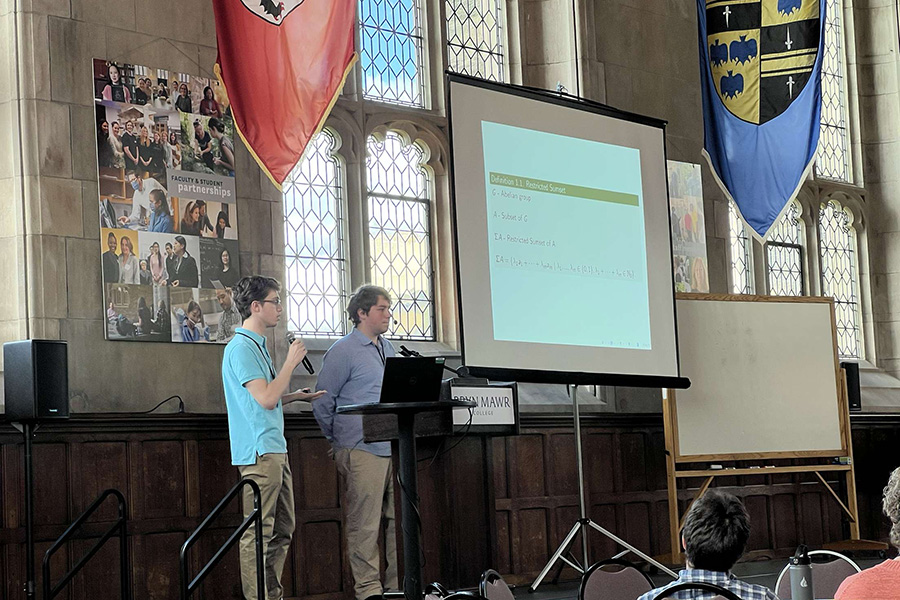
Leveraging the enduring skills of problem solving and communication, Kemmerer challenged himself further to participate in the Philadelphia Undergraduate Mathematics Conference in early April. There, he presented his work from his Intermediate Research in Mathematics course.
“I had never done a presentation like this before, but as soon as I stepped on the stage, all the nervousness I had faded away. It was very exciting to be presenting my research,” he said.
“Dylan is a hardworking, conscientious, and able student with a rare work ethic. His strengths are in his hard work, his skill in analyzing a problem and formulating a solution, his ability to speak and write with great clarity, and his ability to work independently,” Bajnok said. “Due to his performance in the Abstract Mathematics course, he now also works for us as one of two Exploratorium directors. He is entrusted to assist students enrolled in Abstract Mathematics with problems without giving direct answers, to explain problems through examples, and to teach in a more peer-to-peer method.”
Undergraduate research, postgraduate planning
Kemmerer’s coursework in mathematics also dovetails with his interest in systems biology.
“Systems biology falls under the broad category of quantitative biology, the integration of mathematical and computational techniques to study biological phenomena. Systems biology employs a unique holistic approach,” he said. “For example, rather than looking at specific components of an organism, you’re looking at the entire thing and how all of the parts interact with each other as a whole.”
“One of the big draws for Gettysburg for me was X-SIG [the Cross-Disciplinary Science Institute]. The opportunity to conduct research with faculty in such a close environment is something that you wouldn’t get at a larger school.”
– Dylan Kemmerer ’25
Kemmerer also found a home for his developing research interests in the lab of Biology Prof. Jennifer Powell through the Cross-Disciplinary Science Institute (X-SIG).
“One of the big draws for Gettysburg for me was X-SIG. The opportunity to conduct research with faculty in such a close environment is something that you wouldn’t get at a larger school,” he said. “I applied for Prof. Powell’s lab my first summer here; she accepted me, and I spent the summer researching in her lab. Ever since that summer, I’ve stayed with her lab through every semester.”
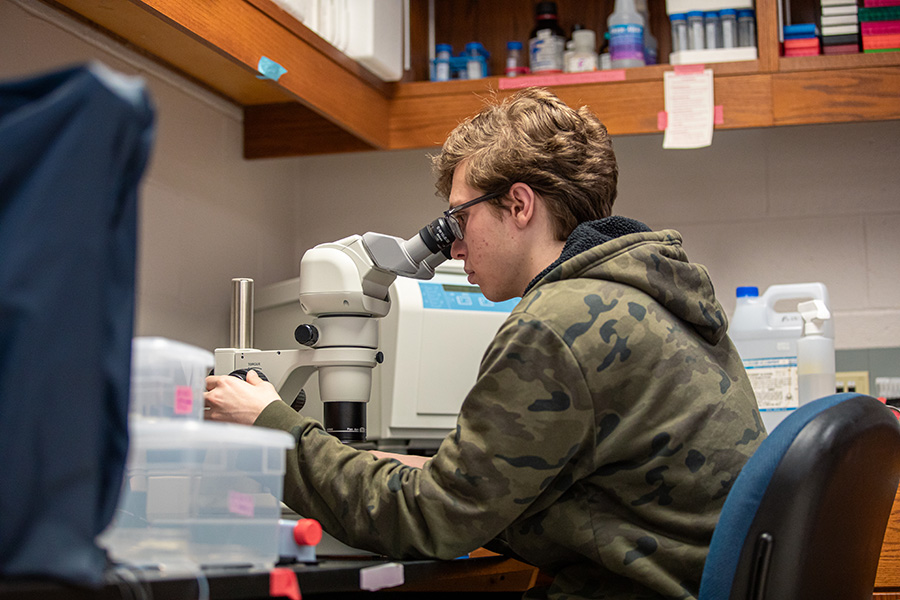
“Dylan joined my research group during his first year at Gettysburg and has been one of the leaders in the lab since then,” Powell said. In her lab, Kemmerer has explored the interconnections of various types of cellular stress and how animal cells detect and respond to stressors, she explained. He’s also studied how neurons can detect temperature changes to enable an animal stressed by the cold to allocate resources to address cold-induced damage and the stress-resistance of offspring.
“His interdisciplinary research-intensive education has prepared him well for the prestigious summer research program he will attend this summer at Cold Spring Harbor as well as any of the top Ph.D. programs in the world,” Powell said. “It has been delightful to mentor him over the past few years, both as a member of the Powell Lab and in the research-focused genetics course he took as a sophomore.”
Outside of the classroom and laboratory, Kemmerer gives back to Gettysburg, helping fellow students as a Peer Learning Associate (PLA) for general biology and chemistry courses. He enjoys the one-on-one information sharing, learning, and the connections he makes with students. In the Mathematics Department, Kemmerer serves as the co-president of the Mathematikoi Math Club and as an Abstract Mathematics PLA, both of which “spread my love for math beyond the classroom,” he said.
Last summer, a research opportunity at Northwestern University—the Northwestern Quantitative Biology Research Experience for Undergraduates (REU), funded through the National Science Foundation—gave Kemmerer a firsthand view into the interdisciplinary nature of the sciences and mathematics.
“It was my first experience seeing how the two areas directly intertwine in a lab,” he explained. “The project involved doing biological experiments with cells. Based on the results of the experiments, you could tell where within your chromosomes the DNA was being positioned. We could compare DNA positioning in healthy cells to that in cancerous cells and then use models to analyze the differences. The ultimate goal was that, given a certain sequencing or positioning of DNA, we wanted to be able to predict whether a certain cell would be more prone to becoming cancerous, for example, to better understand the underlying basis for disease. Having the opportunity to conduct that work was absolutely amazing.”
As a result of Gettysburg’s consequential education, Kemmerer said he’ll spend the fall of his senior year identifying Ph.D. programs to further his studies in systems biology and research interest in pharmacogenomics and personalized cancer treatment. The Goldwater scholar ultimately wants to share his lifelong love for learning by teaching at the university level.
“[Receiving a Goldwater Scholarship is] reflective of the culmination of everything that I’ve done here so far at Gettysburg.”
– Dylan Kemmerer ’25
About the Barry Goldwater Scholarship
The Barry Goldwater Scholarship recognizes college sophomores and juniors who intend to pursue research careers in the natural sciences, mathematics, and engineering. Congress established the scholarship in 1986 to honor the lifetime work of Sen. Barry Goldwater, who served the United States for 56 years as a soldier and statesman, including 30 years in the U.S. Senate. According to the Barry Goldwater Foundation website, Goldwater Scholars are entitled to funding in their junior and senior years, up to a maximum of $7,500 each year, or $15,000 total.
By Michael Vyskocil
Photos by Abbey Frisco
Posted: 04/24/24
